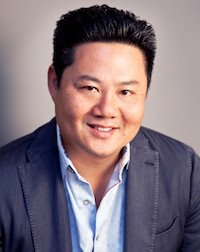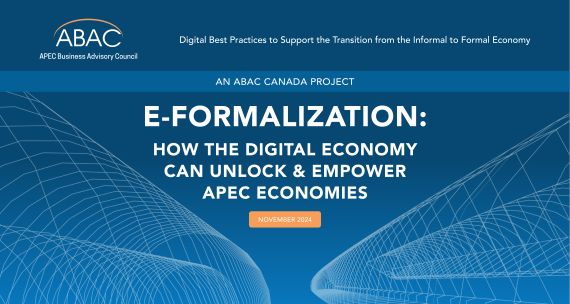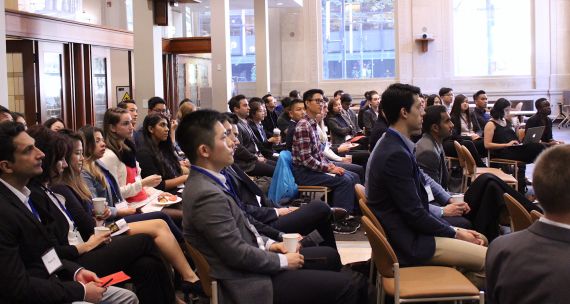The Asia Pacific Foundation of Canada (APF Canada) is organizing an all-new, youth-driven event with partner Cansbridge Fellowship in Vancouver on October 12-13, 2018. Held at Simon Fraser University’s Segal Building, the Building Bridges conference will be the first of its kind, offering a cross-cultural management case study competition to 75 select Canadian post-secondary students. The students will be provided with mentorship and will present their case solutions to 160 delegates and four judges, including business leaders, entrepreneurs, government officials, and thought leaders from across Canada.
The focus will be on the topic of scale as it relates to Canadian opportunities in the Asia Pacific, and students will get a chance to work on current problems faced by companies in Asia. The winning teams will have their proposals sent directly to the companies in question. Click here to apply to attend or for more information on the Cansbridge Conference event.
APF Canada had an opportunity to catch up with Building Bridges keynote speaker Charles Chang prior to the event to ask him about his own experiences as an entrepreneur, and his advice to those who are poised to follow his lead.
What made you choose to be an entrepreneur, and did you see yourself taking that path when you were a student at SFU?
First of all, freedom – the ability to do what you want, when you want and how you want. You’re the boss and you call the shots. Personally, this was the #1 reason why I became an entrepreneur. Second, achievement – it can be very fulfilling and rewarding to create your own business, full of challenges, stimulation, excitement and fun. It’s like playing a game or a sport that you love and that you can keep improving at over time. And you never stop learning and growing.
Third, control of time and money – with most other careers you must choose between one or the other but when you work for yourself you can have your cake and eat it too!
And fourth, social impact – entrepreneurs make things happen; they create jobs, solve problems and help improve the world. It’s much more than just making money.
From as early as I can remember I had lots of little businesses where I would do comic books and sell them door to door, go mow people’s lawns or go catch fish in a pond [to sell to the aquarium]. My parents didn’t really know what to do with me. I wasn’t really great at school and I always learned best when doing things by myself for myself. That’s kind of what entrepreneurship is – someone who follows the beat of their own drum.
What was the most significant challenge you faced as a young entrepreneur, and how did you overcome it?
In starting Vega, I had to invest my entire life savings. I had about $100,000 saved up and invested all of it, ended up getting a second mortgage on my house and maxed out all my credit cards. At one point, I also had to sell my truck, a very special limited edition off-road vehicle, for $27,000, to actually stay in business.
Luckily, over time we got really good at managing our cash, so we were able to be quite financially secure throughout the rest of our growth phrase. You have to be really smart about cash flow and monitor your costs, make sure you collect your accounts receivables as quickly as possible, negotiate longer payment terms with vendors, minimize inventory while ensuring you have enough to fill your orders, and run your business tightly.
How did you scale up your own company?
We grew on the foundations of a strong company culture with clear vision, shared core values, and a triple bottom line approach [social, environmental, and financial] to business. We focused on what we were best at – sales, marketing, customer service) – and outsourced the things that others could do better, such as manufacturing, warehousing, and logistics. We also reinvested all our earnings so we could grow faster. That, along with good cash management practices and an amazing team of passionate people, meant we were able to double in size year-over-year for about the first 10 years in business with zero outside financing.
Why should young Canadian entrepreneurs be paying more attention to Asia?
Asia is such a giant market from a population perspective. And they are still growing so fast. There is a lot of educated talent there as well as significant infrastructure to promote further growth. From a consumer perspective, more and more they want to be like the West, so our deep knowledge of Western markets can be valuable there.
What is the once piece of advice you often give to young entrepreneurs?
Education comes in many different forms – try to explore some opportunities outside of school. Follow your passions – but understand the difference between a hobby and a career. Believe in yourself, no matter what – even when others think you’re crazy.
The path less travelled can be more rewarding (and will likely have more ups and downs), but first you have to take the plunge. Don’t feel you have to be perfect. Instead, be a lifelong learner and try to improve yourself a little bit every day.




